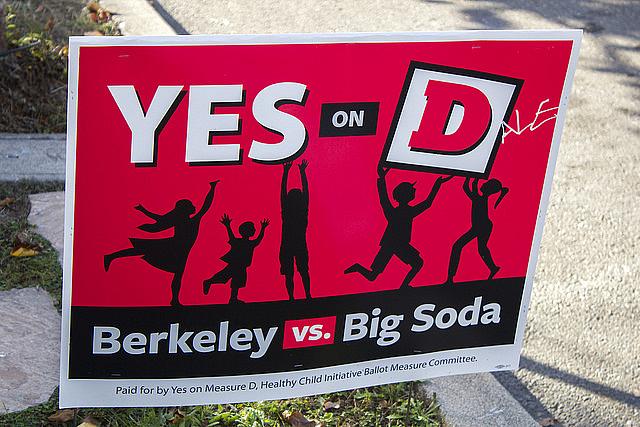Big Gulps for Little Leagues: Beware the source in debate over obesity and soda labels

The city of Berkeley passed a tax on sugary drinks last year.
The Bay Area News Group published a curious op-ed in March titled “Beverage warning labels distract from the big picture of public health.”
It was written by Lisa Katic, who opened by saying:
As a registered dietitian, I know how complex an issue obesity and Type 2 diabetes are to reverse. With myriad risk factors like genetics, stress, age, and physical activity levels all coming into play, it's safe to say there is no silver bullet solution to these diseases.
She went on to say that there has been too much focus on soda as chief cause of the United States epidemic of obesity and diabetes. The piece had the reasonable, let’s-look-at-the-facts tone of someone who just wanted to bring some sanity to a debate that had spun out of control.
And yet, the idea that soda had become the bogeyman in the obesity debate would come as a surprise to most healthy diet advocates. They have been saying for decades that soda is just part of the problem. (For example, here’s Dr. Yoni Freedhoff at Weighty Matters making Katic’s “sugar is sugar” point and noting that juices often have more sugar than soda.)
Freedhoff and others who have been fighting to turn back the obesity tidal wave would agree with one of Katic’s points, which is that “to effectively reduce rates of these various diseases, we need to take a broader look at what individuals are eating, drinking, and doing.”
So what is really going on with this op-ed and others like it?
Well, it seems that Katic and the Bay Area News Group made an error of omission. They didn’t point out up front that Katic is a consultant to the food industry, which obviously has a keen interest in keeping soda sales chugging along. Her article is in a long line of articles that appear to be busting “myths,” as she calls them, when, in fact, they are trying to divert attention.
Shortly after Katic’s piece was posted, her history caught up with her. The first person to leave a comment wrote:
This "commentator" is a paid consultant to the beverage industry, through her business, K Consulting. Her one employee, C. Paul Earhart, is a former manager of General Mills' lobbying office in Washington, D.C. The only purpose for the piece was to serve up the ABA's "supportive" comment below, and attempt to inject Big Soda's self-interested message without connecting it to Big Soda.
And, indeed, the American Beverage Association did offer a comment, saying:
Agreed that education is a more effective tool than regulation when it comes to advancing meaningful health behavior change. The reality is complex health conditions don’t boil down to any one source of calories. Overall dietary balance and physical activity matter, and warning labels won’t teach this balance.
The American Beverage Association is quite busy in the comment boards, actually. It had this to say about Navajo Indians putting a tax on soda:
Quite frankly, if we want to get serious about reducing obesity and diabetes, education will prove far more productive than regulation.
And here they are again on Vermont’s attempt to tax sugar-sweetened beverages:
Education that raises awareness and encourages citizens to adopt healthier habits can make a substantive difference, whereas this type of tax will only unleash unintended consequences without delivering positive returns with respect to health.
And now back to Katic, who wrote:
Educating the public about how many calories they need to achieve and maintain a healthy weight would be a better approach to decreasing obesity and Type 2 diabetes than restricting people's choices or trying to legislature behavior.
See the pattern?
Katic testified against a 2014 warning label law that would have required sugary drinks in California to warn of the risks of obesity and diabetes. Her client at the time was the California Nevada Soft Drink Association.
Next: Why diverting attention from Big Gulps to behavior patterns won’t work
Photo by Quinn Dombrowski via Flickr.

